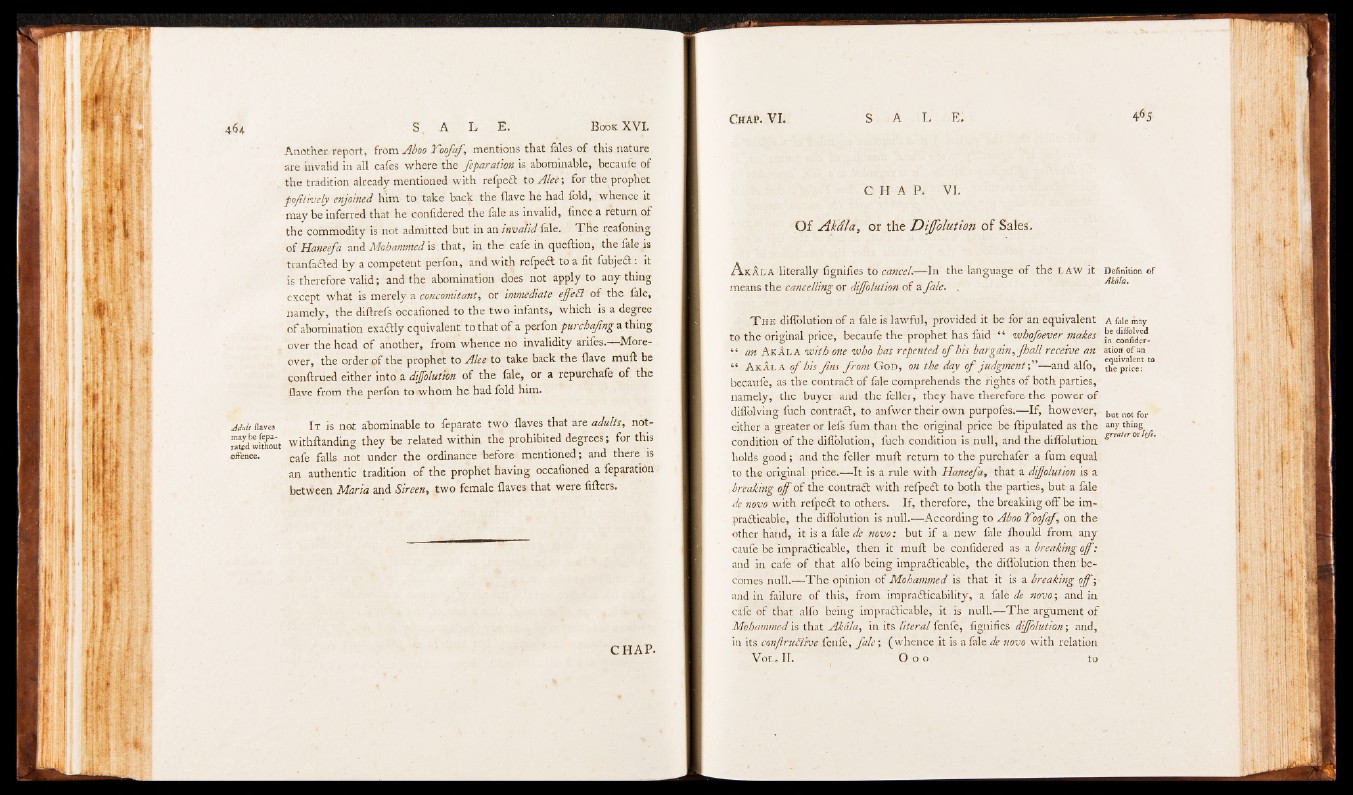
Another, report, from Aboo Toofaf, mentions that fales of this nature
are invalid in all cafes where the feparation is abominable, becaufe of
the tradition already mentioned with refpeCt to Alee; for the prophet
pofitively enjoined him to take back the Have he had fold, whence it
may be inferred that he oonlidered the fale as invalid, fince a return of
the commodity is not admitted but in an invalid fale. The reafoning
of Haneefa and MchuTiimcd is_tlv.it, in the cafe in queftion, the fale is
tranfacled by a competent perfon, and with refpedt to a fit fubject: it
is therefore valid; and the abomination does not apply to anything
except what is merely a concomitant, or immediate effeA of the fale,
namely, the diftrefs occafioned to the two infants, which is a degree
of abomination exactly equivalent to that o f a perion purchasing a thing
over the head of another, from whence no invalidity arifes.— Moreover,
the order of the prophet to Alee to take back the flave muft be
gonftrued either into a diffolution of the fale, or a repurchafe of the
flave from the perfon to whom he had fold him.
Adul, (laves I t is not abominable to feparate two flaves that are. adults, not-
«ttdwithout withftanding they be related within the prohibited degrees; for this
offence. cate falls not under the ordinance before mentioned; and there is
an authentic tradition of the prophet having occafioned a feparation
between Maria and Sireen, two female flaves that were lifters.
C H A P .
C H A P . VI.
Of Akdla, or the Diffolution of Sales.
A k a l a literally fignifies to cancel.— In the language of the law it
means the cancelling or diffolution of a fale. .
T h e diffolution of a fale is lawful, provided it be for an equivalent
to the original price, becaufe the prophet has faid “ whofoever makes
“ an A k Al a with one mho has repented o f his bargain, Jhall receive an
“ A k a l a o f his fins from G o d , on the day o f judgment;”— and alfo,
becaufe, as the contrail of fale comprehends the rights of both parties,
namely, the buyer and the feller, they have therefore the power of
diffolving fuch contrail, to aiifwer their own purpofes.— If, however,
either a greater or lefs fum than the original price be ftipulated as the
condition of the diflolution, fuch condition is null, and the diflolution
holds good; and the feller muft return to the purchafer a fum equal
to the original price.— It is a rule with Haneefa, that a diffolution is a
freaking off of the contract with refpect to both the parties, but a fale
de novo with refpedt to others. If, therefore, the breaking off be impracticable,
the diffolution is null.— According to Aboo Yoofcff, on the
other hand, it- is a fale de novo: but if a new fale fhould from any
caufe be impracticable, then it muft be confidered as a breaking off:
and in cafe of that alfo being impracticable, the diflolution then becomes
null.— The opinion of Mohammed is that it is a breaking off ;>
and in failure of this, from impracticability, a fale de novo-, and in
cafe of that alfo being impracticable, it . is null.— The argument of
Mohammed is that Ak&la, in its literal fenfe, fignifies diffolution; and,
in its conjlrudlive fenfe, fa le ; (whence it is a fale de novo with relation
V ol. II. O o o to
Definition o f
Akala•
A fale may
be diffolved
in consideration
o f an
equivalent to
the price:
but not for
any thing
greater or lefs.